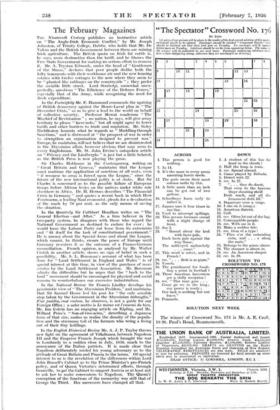The February Magazines
In the Fortnightly Mr. F. Hammond commends the uprising of British democracy against the Hoare-Laval plan in " The December Crisis," so as to give a lead to the world on behalf of collective security. Professor Mowat condemns " The Mischief of Revisionism " ; no nation, he says, will give away territory to please " have-nots," but all might agree to lower tariffs and other barriers to trade and migration. Mr. Sisley Iluddleston laments what he regards as " Muddling through Sanctions," and is distressed at " the prospect of war in order to strengthen an organisation designed to prevent war." Europe, he maintains, will not believe that we are disinterested in the Abyssinian affair, however obvious that may seem to every Englishman. Mr. St. John Ervine's outspoken article on " Privacy and the Lindberghs " is just but a little belated, as the British Press is now playing the game.
Sir Charles Hobhousc in the Contemporary, writing on Great Britain and Geneva," maintains that the League must continue the application of sanctions at all costs, even
if recourse to arms is forced upon the League," since the future of the new international polity is at stake. But Sir Charles is concerned as to the possible failure of European troops before African levies on the natives under white rule elsewhere in Africa. Dr. H. Hermes describes " The Financial Crisis in Germany " and quotes a recent book in which Herr Forstmann, a leading Nazi economist, pleads for a devaluation of the mark by 70 per cent. as the only means of saving the situation.
In the Quarterly Sir Cuthbert Headlam writes on " The General Election-and After." As a firm believer in the two-party system, he disagrees with those who regard the National Government as destined to endure for ever ; he would have the Labour Party cut loose from its extremists and " fit itself for the task of constitutional government." He is uneasy about the Special Areas and about the League, which cannot, he thinks, ensure the peace of Europe until Germany re-enters it as the outcome of a Franco-German reconciliation. French opinion, as analysed by Mr. Walter Crotch in another article, shows no sign of belief in such a possibility. Mr. S. L. Bensusan's account of what has been done for ' Land Settlement in England and Wales " is of special interest at this time, in view of the purchase of more estates by the Land Settlement Association. Mr. Bensusan admits the difficulties but he urges that the " back to the land " movement should be encouraged for physical and social reasons to counterbalance our excessive industrialism.
In the National Review Sir Francis Lindley develops his pessimistic view of " The Abyssinian Problem," and maintains that Sir Samuel Hoare lost his post. for " the only sensible -step taken by the Government in the Abyssiniatrimbroglitr." Fiat justilia,ruat coelum, he observes, is not a guide for our Foreign Office ; a safer motto is Le mieux est rennemi die lien. Mr. Ian Colvin has an engaging article on Kipling, and Mr. Willard Price's " Son-of-two-acres," describing a Japanese farm of that size, makes us realise the density of the popula- tion and the strenuous toil of the farmers who wring a living out of their 'tiny haldings.
In the English Historical Review Mr. A. J. P. Taylor throws new light on the agreement of Villafranca. between Napoleon III and the Emperor Francis Joseph which brought the war in Lombardy to a sudden close in July, 1859, much to the annoyance of the Italian patriots. It is made clear that Napoleon deliberately misled his young adversary as to the attitude of Great Britain and Prussia to the terms. Of special interest to us is the revelation of the differences within Lord John Russell's Cabinet as to the Prime Minister's pro-French policy, and of Queen Victoria's determined efforts, through Granville, to get the Cabinet to support Austria or at least no to ask her to make concessions to Napoleon. The Queen's conception of the functions of the monarchy was still that of George the Third. Her successors have changed all that.














































 Previous page
Previous page